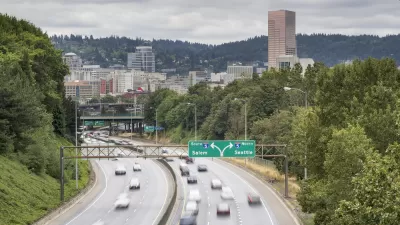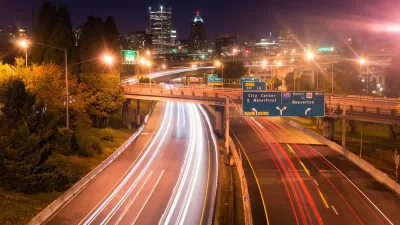The state’s plan to implement tolls to reduce congestion and promote alternate transportation modes is facing some backlash as critics argue the revenue shouldn’t fund road expansion projects.

Oregon’s plans to introduce tolls on many of the state’s freeways has drawn concern even from supporters of toll roads, who say that the potential costs could negatively impact low-income residents. While tolling can be a useful traffic management and emissions reduction tool, critics say the state’s department of transportation (ODOT) shouldn’t use toll revenue to fund road expansion projects, writes Jayati Ramakrishnan in Oregon Live.
While the actual costs of tolling are yet to be determined, economist Joe Cortright made his own calculation, which ODOT disputes. “Piecing together public records and disparate numbers ODOT has released over the last few years, Cortright concluded that tolls on either an I-5 or I-205 route could pile up to as much as $30 for a hypothetical round-trip commute between Wilsonville and Vancouver during peak hours — when tolling rates would be at their highest to discourage congestion.” However, the article also points out that low-income drivers are more likely to drive outside of peak commute hours.
ODOT officials argue that proposed road and bridge projects are necessary to maintain the safety of the state’s transportation infrastructure. The agency also plans to offer reduced prices for low-income drivers. To address the inherent inequity in supporting road expansion projects, two proposed state bills would require a percentage of toll revenue to go to public transit projects and task ODOT with developing a clear low-income tolling plan.
FULL STORY: Tolls are coming to Portland-area freeways, and even tolling fans worry they’ll stack up

Planetizen Federal Action Tracker
A weekly monitor of how Trump’s orders and actions are impacting planners and planning in America.

Restaurant Patios Were a Pandemic Win — Why Were They so Hard to Keep?
Social distancing requirements and changes in travel patterns prompted cities to pilot new uses for street and sidewalk space. Then it got complicated.

Map: Where Senate Republicans Want to Sell Your Public Lands
For public land advocates, the Senate Republicans’ proposal to sell millions of acres of public land in the West is “the biggest fight of their careers.”

Maui's Vacation Rental Debate Turns Ugly
Verbal attacks, misinformation campaigns and fistfights plague a high-stakes debate to convert thousands of vacation rentals into long-term housing.

San Francisco Suspends Traffic Calming Amidst Record Deaths
Citing “a challenging fiscal landscape,” the city will cease the program on the heels of 42 traffic deaths, including 24 pedestrians.

California Homeless Arrests, Citations Spike After Ruling
An investigation reveals that anti-homeless actions increased up to 500% after Grants Pass v. Johnson — even in cities claiming no policy change.
Urban Design for Planners 1: Software Tools
This six-course series explores essential urban design concepts using open source software and equips planners with the tools they need to participate fully in the urban design process.
Planning for Universal Design
Learn the tools for implementing Universal Design in planning regulations.
Heyer Gruel & Associates PA
JM Goldson LLC
Custer County Colorado
City of Camden Redevelopment Agency
City of Astoria
Transportation Research & Education Center (TREC) at Portland State University
Camden Redevelopment Agency
City of Claremont
Municipality of Princeton (NJ)





























